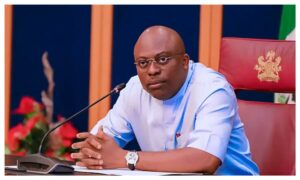
The Rivers State House of Assembly has formally initiated impeachment proceedings against Governor Siminalayi Fubara and Deputy Governor Ngozi Odu, citing allegations of gross misconduct. This action marks a significant escalation in the ongoing political tensions within the state.
On March 17, 2025, the Assembly issued a notice accusing both officials of actions amounting to gross misconduct. The notice stated: “In compliance with Section 188 of the Constitution of the Federal Republic of Nigeria, 1999 (as amended), and other extant laws, we, the undersigned members of the Rivers State House of Assembly, hereby forward to you a Notice of Gross Misconduct by the Deputy Governor of Rivers State in the performance of the functions of her office.”
This development follows a series of contentious interactions between the executive and legislative branches. Notably, Governor Fubara’s recent attempt to present the 2025 budget was thwarted when he was reportedly denied access to the Assembly complex. In response, the Governor claimed to have formally notified the Assembly of his intention to present the budget, a claim disputed by Assembly members.
Further intensifying the situation, the Assembly, led by Speaker Martin Amaewhule, adjourned its plenary sessions indefinitely on March 14, 2025. This adjournment occurred despite the Governor’s renewed efforts to reschedule the budget presentation in compliance with a Supreme Court directive.
The political landscape is further complicated by the involvement of former Governor and current Minister of the Federal Capital Territory, Nyesom Wike. Reports suggest that a faction of the Assembly, allegedly loyal to Wike, is leading the impeachment initiative. Wike has publicly commented on the situation, indicating that the impeachment of his successor would not be unprecedented.
As the impeachment process unfolds, concerns about governance and administrative continuity in Rivers State are mounting. The indefinite adjournment of the Assembly raises questions about the timely passage of the 2025 budget and the potential impact on public services and development projects.
The situation remains fluid, with stakeholders and observers keenly monitoring the developments. The outcome of this political impasse will significantly influence the state’s trajectory in the coming months.




